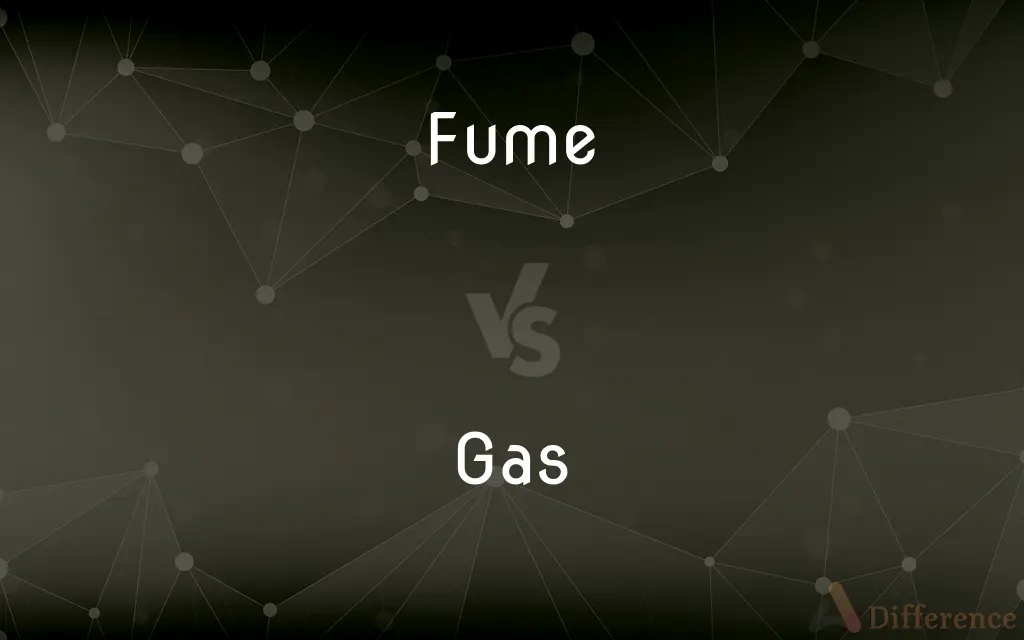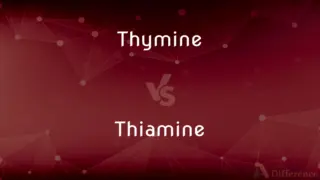Fume vs. Gas — What's the Difference?
By Tayyaba Rehman & Maham Liaqat — Updated on April 22, 2024
Fume consists of airborne particles formed by condensation of vapors, typically containing metal oxides, while gas is a state of matter made of molecules in free motion without a fixed shape or volume.

Difference Between Fume and Gas
Table of Contents
ADVERTISEMENT
Key Differences
Fume refers to tiny solid particles suspended in the air, often generated through processes like welding or combustion. These particles are usually the result of vaporized solid materials that cool and condense into fine particulates. On the other hand, gas is a collection of atoms or molecules that are widely separated, moving independently, and can expand indefinitely to fill any container. Unlike fumes, which originate from solid sources, gases can be elements or compounds in their natural state, like oxygen or carbon dioxide.
Fumes are typically visible due to the presence of solid particles that scatter light, making them often appear as smoke or mist. Conversely, many gases are invisible, making their presence detectable only through specific conditions or equipment. For instance, carbon monoxide is a colorless, odorless gas that is undetectable without special instruments.
The health risks associated with fumes can be significant, particularly because they often contain hazardous substances like metal oxides or carbon particles. In contrast, the health effects of gases vary widely; some gases are harmless, while others can be toxic or asphyxiants, depending on their chemical properties and concentrations.
In terms of applications, fumes are frequently addressed in industrial and occupational health contexts, as controlling exposure is critical to safety. Gases, however, play broader roles across various industries, including medical, environmental, and energy sectors, where their properties are harnessed in different ways.
Fume extraction systems are engineered to capture airborne particles and purify air in environments like factories and workshops. Meanwhile, gas management often involves storage under pressure in cylinders and controlled release via valves and regulators, showcasing different handling and containment strategies.
ADVERTISEMENT
Comparison Chart
Composition
Particles from condensed vapors, often metal oxides
Molecules in free motion, can be elemental or compound
Visibility
Usually visible as smoke or mist
Often invisible, except under specific conditions
Health risks
Often toxic, depends on particle composition
Varies, can be inert or toxic
Applications
Industrial safety, air purification
Medical, environmental, energy applications
Handling
Requires extraction and filtration systems
Stored and managed using pressurized containers
Compare with Definitions
Fume
Airborne particles created by condensation of solid material vapors.
The workshop was filled with fumes from the welding process.
Gas
Can be stored under pressure.
Oxygen gas is stored in cylinders for medical use.
Fume
Often associated with industrial processes.
Fume extraction systems are essential in factories.
Gas
State of matter composed of freely moving molecules.
Helium gas is used to fill balloons.
Fume
Requires control for occupational health.
Regulations mandate effective fume management in workplaces.
Gas
Invisible under normal conditions.
Natural gas is used widely for heating and cooking.
Fume
Can contain hazardous materials.
Protective gear is necessary to avoid inhaling toxic fumes.
Gas
Integral to various industrial applications.
Carbon dioxide gas is used in fire extinguishers.
Fume
Visible emissions of fine particulates.
During metal cutting, visible fumes are often produced.
Gas
Varies widely in chemical properties.
Some gases are inert, like argon, while others are highly reactive.
Fume
An amount of gas or vapour that smells strongly or is dangerous to inhale
Clouds of exhaust fumes spewed by cars
Gas
Gas is one of the four fundamental states of matter (the others being solid, liquid, and plasma).A pure gas may be made up of individual atoms (e.g. a noble gas like neon), elemental molecules made from one type of atom (e.g.
Fume
Feel, show, or express great anger
‘We simply cannot have this’, she fumed
The minister reportedly fumed at officials of the department
Gas
A substance or matter in a state in which it will expand freely to fill the whole of a container, having no fixed shape (unlike a solid) and no fixed volume (unlike a liquid)
Hot balls of gas that become stars
Poisonous gases
Fume
Emit gas or vapour
Fragments of lava hit the ground, fuming and sizzling
Gas
Short for gasoline
We stopped for gas
Fume
Vapor, gas, or smoke, especially if irritating, harmful, or strong.
Gas
An entertaining or amusing person or situation
The party would be a gas
Fume
A strong or acrid odor.
Gas
Kill or harm by exposure to gas
My son was gassed at Verdun
Fume
A state of resentment or vexation.
Gas
Talk excessively about trivial matters
I thought you'd never stop gassing
Fume
To subject to or treat with fumes.
Gas
Fill the tank of (a motor vehicle) with petrol
After gassing up the car, he went into the restaurant
Fume
To give off in or as if in fumes.
Gas
Very amusing or entertaining
Ruthie, that's gas—you're a gem
Fume
To emit fumes.
Gas
The state of matter distinguished from the solid and liquid states by relatively low density and viscosity, relatively great expansion and contraction with changes in pressure and temperature, the ability to diffuse readily, and the spontaneous tendency to become distributed uniformly throughout any container.
Fume
To rise in fumes.
Gas
A substance in the gaseous state.
Fume
To feel or show resentment or vexation.
Gas
Any of various mixtures of flammable gases used for lighting, heating, or cooking.
Fume
A gas or vapour/vapor that is strong-smelling or dangerous to inhale.
Don't stand around in there breathing the fumes while the adhesive cures.
Gas
Gasoline.
Fume
A material that has been vaporized from the solid or liquid state to the gas state and re-coalesced to the solid state.
Lead fume is a greyish powder, mainly comprising lead sulfate.
Gas
The speed control of a gasoline engine. Used with the
Step on the gas.
Fume
Rage or excitement which deprives the mind of self-control.
Gas
A gaseous asphyxiant, irritant, or poison.
Fume
Anything unsubstantial or airy; idle conceit; vain imagination.
Gas
A gaseous anesthetic, such as nitrous oxide.
Fume
The incense of praise; inordinate flattery.
Gas
Flatulence.
Fume
(obsolete) A passionate person.
Gas
Flatus.
Fume
(transitive) To expose (something) to fumes; specifically, to expose wood, etc., to ammonia in order to produce dark tints.
Gas
(Slang) Idle or boastful talk.
Fume
(transitive) To apply or offer incense to.
Gas
(Slang) Someone or something exceptionally exciting or entertaining
The party was a gas.
Fume
(intransitive) To emit fumes.
Gas
To treat chemically with gas.
Fume
(intransitive) To pass off in fumes or vapours.
Gas
To overcome, disable, or kill with poisonous fumes.
Fume
To express or feel great anger.
He’s still fuming about the argument they had yesterday.
Gas
To give off gas.
Fume
To be as in a mist; to be dulled and stupefied.
Gas
(Slang) To talk excessively.
Fume
Exhalation; volatile matter (esp. noxious vapor or smoke) ascending in a dense body; smoke; vapor; reek; as, the fumes of tobacco.
The fumes of new shorn hay.
The fumes of undigested wine.
Gas
Matter in an intermediate state between liquid and plasma that can be contained only if it is fully surrounded by a solid (or in a bubble of liquid, or held together by gravitational pull); it can condense into a liquid, or can (rarely) become a solid directly by deposition.
A lot of gas had escaped from the cylinder.
Fume
Rage or excitement which deprives the mind of self-control; as, the fumes of passion.
Gas
(uncountable) A flammable gaseous hydrocarbon or hydrocarbon mixture used as a fuel, e.g. for cooking, heating, electricity generation or as a fuel in internal combustion engines in vehicles, especially natural gas.
Gas-fired power stations have largely replaced coal-burning ones.
Fume
Anything vaporlike, unsubstantial, or airy; idle conceit; vain imagination.
A show of fumes and fancies.
Gas
Poison gas.
The artillery fired gas shells into the enemy trenches.
Fume
The incense of praise; inordinate flattery.
To smother him with fumes and eulogies.
Gas
A chemical element or compound in such a state.
The atmosphere is made up of a number of different gases.
Fume
Solid material deposited by condensation of fumes; as, lead fume (a grayish powder chiefly lead sulphate).
Gas
(countable) A hob on a gas cooker.
She turned the gas on, put the potatoes on, then lit the oven.
Fume
To smoke; to throw off fumes, as in combustion or chemical action; to rise up, as vapor.
Where the golden altar fumed.
Silenus lay,Whose constant cups lay fuming to his brain.
Gas
(uncountable) Methane or other waste gases trapped in one's belly as a result of the digestive process; flatus.
My tummy hurts so bad – I have gas.
Fume
To be as in a mist; to be dulled and stupefied.
Keep his brain fuming.
Gas
(slang) A humorous or entertaining event or person.
Fume
To pass off in fumes or vapors.
Their parts are kept from fuming away by their fixity.
Gas
(slang) Frothy or boastful talk; chatter.
Fume
To be in a rage; to be hot with anger.
He frets, he fumes, he stares, he stamps the ground.
While her mother did fret, and her father did fume.
Gas
(baseball) A fastball.
The closer threw him nothing but gas.
Fume
To expose to the action of fumes; to treat with vapors, smoke, etc.; as, to bleach straw by fuming it with sulphur; to fill with fumes, vapors, odors, etc., as a room.
She fumed the temple with an odorous flame.
Gas
Arterial or venous blood gas.
Fume
To praise inordinately; to flatter.
They demi-deify and fume him so.
Gas
Marijuana, typically of high quality.
Fume
To throw off in vapor, or as in the form of vapor.
The heat will fume away most of the scent.
How vicious hearts fume frenzy to the brain!
Gas
, a light derivative of petroleum used as fuel.
Fume
A cloud of fine particles suspended in a gas
Gas
Ellipsis of gas pedal
Fume
Be mad, angry, or furious
Gas
An internal virtual currency used in Ethereum to pay for certain operations, such as blockchain transactions.
Gas fee
Fume
Emit a cloud of fine particles;
The chimney was fuming
Gas
(transitive) To attack or kill with poison gas.
The Nazis gassed millions of Jews during the Holocaust.
He never fully recovered after he was gassed on the Western Front.
Fume
Treat with fumes, expose to fumes, especially with the aim of disinfecting or eradicating pests
Gas
To talk in a boastful or vapid way; chatter.
Fume
Be wet with sweat or blood, as of one's face
Gas
To impose upon by talking boastfully.
Gas
(intransitive) To emit gas.
The battery cell was gassing.
Gas
(transitive) To impregnate with gas.
To gas lime with chlorine in the manufacture of bleaching powder
Gas
(transitive) To singe, as in a gas flame, so as to remove loose fibers.
To gas thread
Gas
(US) To give a vehicle more fuel in order to accelerate it.
The cops are coming. Gas it!
Gas
(US) To fill (a vehicle's fuel tank) with fuel.
Gas
(slang) comical, zany; fun, amusing.
Mary's new boyfriend is a gas man.
It was gas when the bird flew into the classroom.
Gas
An aëriform fluid; - a term used at first by chemists as synonymous with air, but since restricted to fluids supposed to be permanently elastic, as oxygen, hydrogen, etc., in distinction from vapors, as steam, which become liquid on a reduction of temperature. In present usage, since all of the supposed permanent gases have been liquified by cold and pressure, the term has resumed nearly its original signification, and is applied to any substance in the elastic or aëriform state.
Gas
A complex mixture of gases, of which the most important constituents are marsh gas, olefiant gas, and hydrogen, artificially produced by the destructive distillation of gas coal, or sometimes of peat, wood, oil, resin, etc. It gives a brilliant light when burned, and is the common gas used for illuminating purposes.
Gas
Same as gasoline; - a shortened form. Also, the accelerator pedal of a motor vehicle; used in the term " step on the gas".
Gas
The accelerator pedal of a motor vehicle; used in the term " step on the gas".
Gas
Same as natural gas.
Gas
An exceptionally enjoyable event; a good time; as, The concert was a gas.
Gas
To singe, as in a gas flame, so as to remove loose fibers; as, to gas thread.
Gas
To impregnate with gas; as, to gas lime with chlorine in the manufacture of bleaching powder.
Gas
To expose to a poisonous or noxious gas
Gas
The state of matter distinguished from the solid and liquid states by: relatively low density and viscosity; relatively great expansion and contraction with changes in pressure and temperature; the ability to diffuse readily; and the spontaneous tendency to become distributed uniformly throughout any container
Gas
A fluid in the gaseous state having neither independent shape nor volume and being able to expand indefinitely
Gas
A volatile flammable mixture of hydrocarbons (hexane and heptane and octane etc.) derived from petroleum; used mainly as a fuel in internal-combustion engines
Gas
A state of excessive gas in the alimentary canal
Gas
A pedal that controls the throttle valve;
He stepped on the gas
Gas
A fossil fuel in the gaseous state; used for cooking and heating homes
Gas
Attack with gas; subject to gas fumes;
The despot gassed the rebellious tribes
Gas
Show off
Common Curiosities
How can fume exposure be controlled?
Using fume extraction systems and ensuring proper ventilation can control fume exposure in industrial settings.
Are all gases invisible?
Many gases are invisible, but some can show color under specific conditions, like chlorine gas, which is greenish.
What are fumes made of?
Fumes consist of very small particles that form from the condensation of vaporized solid materials.
Do gases have a fixed shape or volume?
Gases do not have a fixed shape or volume; they expand to fill their container.
Can fumes be harmful to health?
Yes, fumes can be harmful, especially if they contain toxic metals or other hazardous substances.
What are some common uses of gases?
Gases are used in various fields, including medicine for anesthesia, in industries for manufacturing, and in homes for heating.
Can gases be converted into other states of matter?
Yes, gases can be liquefied or solidified under appropriate temperature and pressure conditions.
What roles do gases play in the environment?
Gases like carbon dioxide and methane are critical in climate dynamics as greenhouse gases.
Is carbon dioxide considered a gas or a fume?
Carbon dioxide is a gas, as it consists of carbon and oxygen molecules in a free state.
Are fumes always a byproduct of industrial activities?
While commonly produced in industrial settings, fumes can also occur from natural processes like volcanic activity.
What are the visual characteristics of fumes?
Fumes are generally visible and can appear similar to smoke or mist.
What determines the toxicity of a gas?
The chemical composition and concentration of the gas determine its toxicity.
How are gases stored and transported?
Gases are often compressed and stored in cylinders, transported under pressure.
How are gases measured or detected?
Gases can be measured using various sensors and instruments depending on their type.
What safety measures are recommended when handling gases?
Safety measures include using proper containment, ventilation, and following handling protocols specific to the gas's properties.
Share Your Discovery

Previous Comparison
Very vs. Quite
Next Comparison
Thymine vs. ThiamineAuthor Spotlight
Written by
Tayyaba RehmanTayyaba Rehman is a distinguished writer, currently serving as a primary contributor to askdifference.com. As a researcher in semantics and etymology, Tayyaba's passion for the complexity of languages and their distinctions has found a perfect home on the platform. Tayyaba delves into the intricacies of language, distinguishing between commonly confused words and phrases, thereby providing clarity for readers worldwide.
Co-written by
Maham Liaqat













































